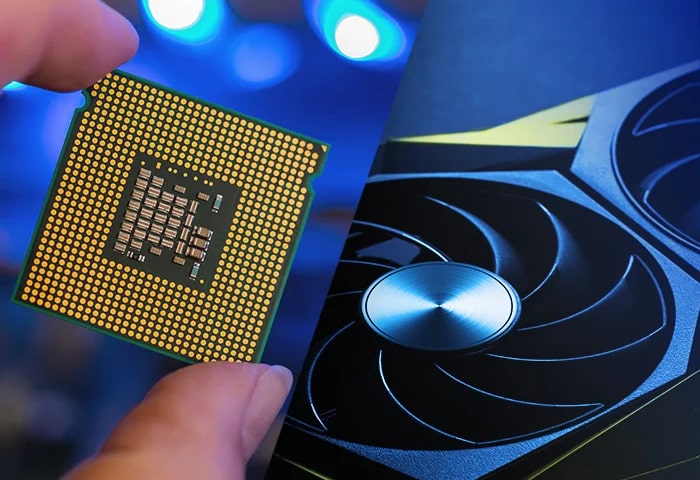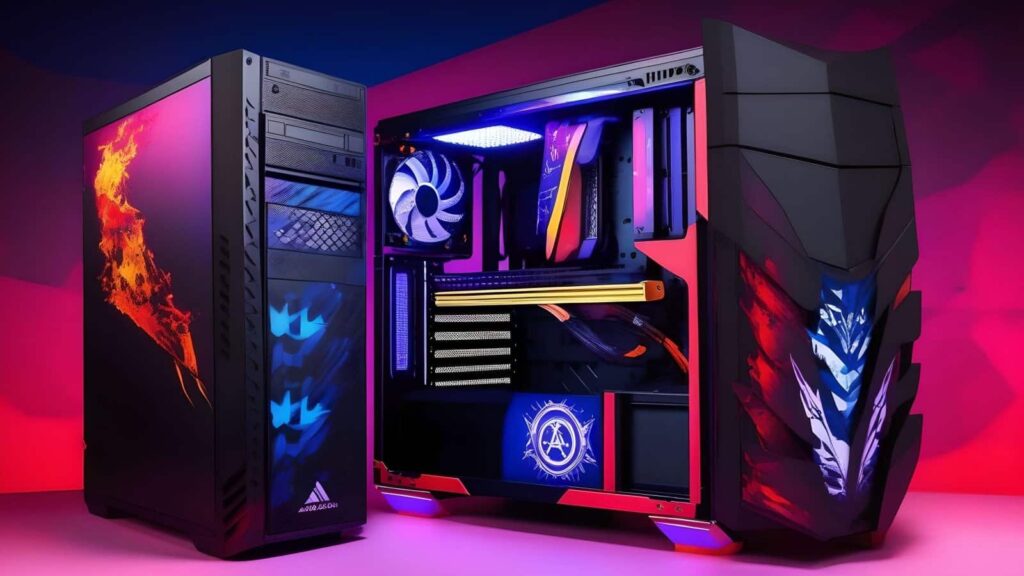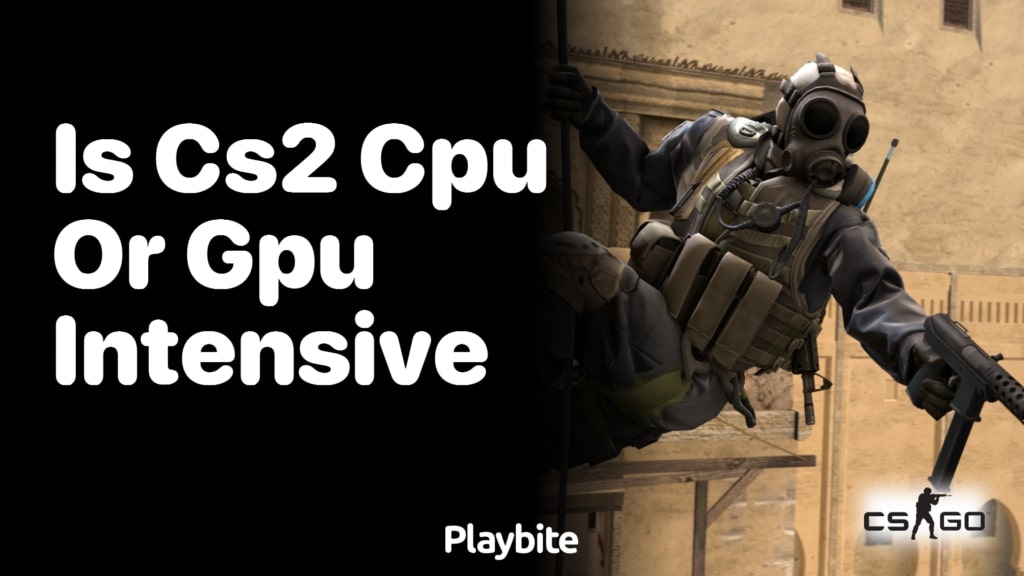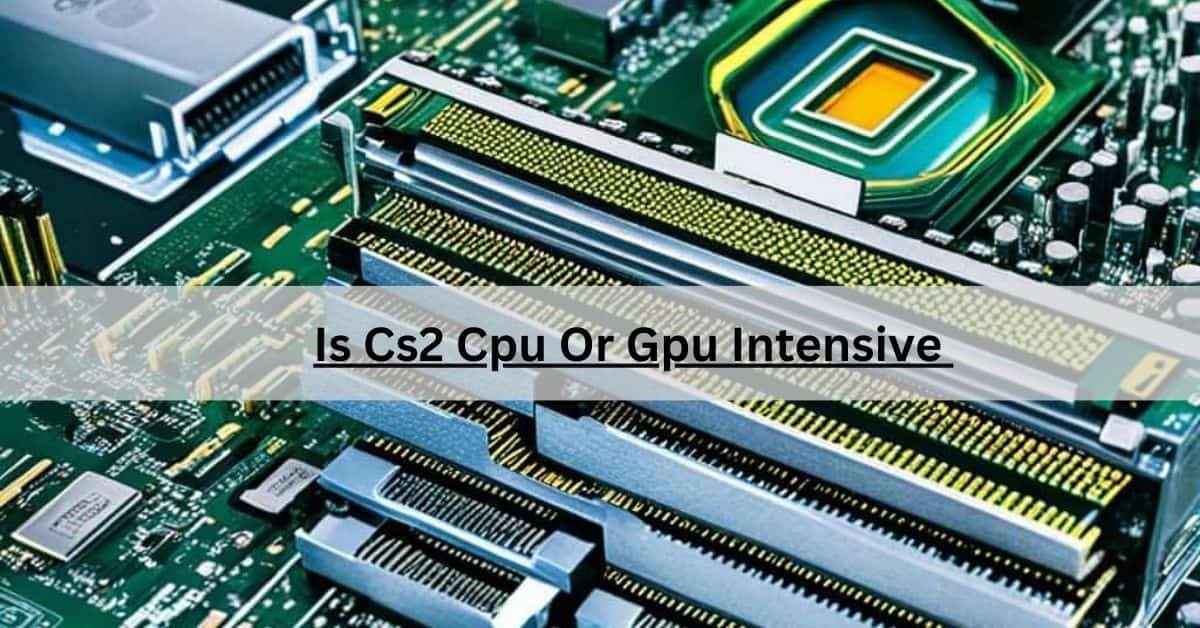When I started playing CS2, I noticed it leaned more on my GPU for smooth graphics, but my CPU spiked during intense gameplay moments. Upgrading my GPU made a big difference, but a strong CPU still helps with consistent frame rates. From my experience, balancing both is key for the best performance.
CS2 is primarily GPU-intensive, relying on powerful graphics cards for smooth visuals and high frame rates. However, the CPU also plays a critical role in handling game logic and physics. For the best experience, a balanced setup with a strong GPU and a capable CPU is ideal.
In this article, we will discuss all about “Is Cs2 Cpu Or Gpu Intensive ”
What Does It Mean for a Game to Be CPU or GPU Intensive?

A game is CPU-intensive when it uses the processor for tasks like AI, physics, and game logic. It’s GPU-intensive when it relies more on the graphics card for rendering visuals and effects. Some games need both for smooth gameplay, depending on their design and performance requirements.
Read More: How Much Rpm For Cpu Fan – Find The Perfect Speed!
Is CS2 More Dependent on CPU or GPU Performance?
- CS2 relies more on the GPU for rendering high-quality visuals and smooth frame rates.
- The CPU is important for tasks like game logic, physics calculations, and managing multiple players in online matches.
- A strong GPU generally has a bigger impact on overall performance in CS2.
- For the best experience, balance your system with a capable GPU and a moderately powerful CPU.
How Does CS2 Utilize the CPU During Gameplay?
CS2 relies on the CPU for several essential tasks to ensure smooth and responsive gameplay. Here’s how the CPU contributes:
1. Game Logic and AI Processing
Game logic and AI processing handle how characters and objects in a game behave. It includes decisions made by computer-controlled players and how the game reacts to user actions. This requires a strong CPU, as it processes these tasks in real time to ensure smooth and responsive gameplay.
2. Physics Calculations
Physics calculations in games like CS2 handle the movement, collisions, and interactions between objects. These calculations rely on the CPU for accurate results, ensuring smooth gameplay. A strong CPU helps manage these processes alongside the GPU, which handles the graphics, to keep the game running smoothly.
3. Multiplayer Synchronization
Multiplayer synchronization in games refers to keeping all players’ actions and game states in sync across different devices. This ensures that everyone experiences the same game moment, even if there are delays or lag. It helps make multiplayer games smooth and fair for all players involved.
4. Background Processes
Background processes are programs or tasks running on your computer while you’re using other software. They can slow down your system, especially in games like CS2. It’s important to close unnecessary background processes to improve performance and make sure your CPU and GPU focus on the game.
5. Utilization of Multi-Core CPUs
CS2 can benefit from a multi-core CPU, as it allows the game to use more processor cores for different tasks. This helps improve performance, especially during complex scenes or intense moments. A CPU with multiple cores ensures smoother gameplay and reduces lag, leading to a better overall gaming experience.
What Role Does the GPU Play in CS2 Performance?
The GPU plays a major role in CS2 by handling the game’s graphics, ensuring smooth visuals, and maintaining high frame rates. It processes textures, shadows, and other graphical elements, which improves the overall gameplay experience. A powerful GPU allows for better graphics quality and smoother performance, especially in action-packed moments.
How Does CS2 Utilize the CPU During Gameplay?
CS2 uses the CPU to manage tasks like game physics, AI, and background processes during gameplay. It ensures smooth interactions, quick responses, and consistent performance. A faster CPU with multiple cores helps handle these tasks better, especially in high-action moments, reducing lag and keeping the game running smoothly.
Can I Play CS2 with a Low-End CPU or GPU?
Yes, you can play CS2 with a low-end CPU or GPU, but the performance might not be smooth. Lowering the game settings, like resolution and graphics quality, can help improve frame rates. However, for a better experience, a mid-range GPU and a decent CPU are recommended.
What Are the Minimum GPU Requirements for CS2?
The minimum GPU requirement for CS2 is a DirectX 11-compatible graphics card with at least 2GB of VRAM. Popular options like the NVIDIA GTX 750 Ti or AMD Radeon HD 7950 can handle the game at lower settings. For better performance, consider upgrading to a more powerful GPU.
Do I Need a High-End CPU to Run CS2 Smoothly?

No, you don’t need a high-end CPU to run CS2 smoothly, but having a decent processor helps. CS2 relies more on the GPU for graphics, but the CPU handles tasks like physics and game logic. A mid-range CPU paired with a good GPU is enough for a smooth gaming experience.
Read More: Cpu Z Not Working – Solve It With These Steps!
How Can I Optimize My PC for Better CS2 Performance?
1.Update Drivers:
Updating drivers helps your computer work better by ensuring hardware like graphics cards, printers, and sound systems run smoothly. It can fix bugs, improve performance, and add new features. To update, go to the manufacturer’s website or use your device’s update tool for the latest version.
2. Adjust In-Game Settings:
To adjust in-game settings for better performance in CS2, lower the graphics quality, turn off unnecessary effects, and reduce the resolution if needed. Focus on settings that balance visuals and frame rates, ensuring smoother gameplay without putting too much load on your CPU or GPU.
3. Close Background Apps:
Closing background apps can improve your computer’s performance when playing games like CS2. Background apps use your CPU and RAM, slowing down the game. To get smoother gameplay, close unnecessary programs and focus your system’s resources on the game. This is an easy way to boost performance.
4. Upgrade Hardware:
Upgrading hardware means replacing old computer parts with new ones to make your PC faster and better. Common upgrades include improving the CPU, GPU, RAM, or storage. This helps boost performance for gaming, work, or everyday tasks.
5. Use Game Mode:
CS2 is mostly GPU-intensive, meaning it depends on a strong graphics card for smooth visuals and gameplay. However, the CPU is also important for managing tasks like physics and game logic. A good balance between a powerful GPU and a capable CPU will give the best performance.
Does Overclocking the CPU Improve CS2 Performance?
- Increased Clock Speed: Overclocking the CPU boosts its clock speed, potentially improving overall performance in CPU-heavy tasks.
- Better Frame Rates: It may provide a slight increase in frame rates, especially in CPU-bound scenes or complex game logic.
- Higher Temperatures: Overclocking can cause the CPU to run hotter, requiring better cooling to avoid thermal throttling.
- Limited Impact in CS2: CS2 is more GPU-dependent, so overclocking the CPU may not drastically improve performance compared to upgrading the GPU.
- Potential Stability Issues: Overclocking can cause system instability or crashes if not done carefully, affecting gameplay.
Can a Bottleneck in the CPU or GPU Affect CS2 Performance?
1. Lower Frame Rates:
Lower frame rates in CS2 can cause a choppy or laggy experience, making the game harder to play smoothly. This usually happens when the GPU or CPU cannot handle the game’s demands. Upgrading your hardware or adjusting game settings can help improve frame rates and make gameplay more enjoyable.
2. Reduced Visual Quality:
Reduced visual quality in games like CS2 refers to lower graphics settings that can make the game look less detailed. This often happens when your computer’s CPU or GPU isn’t strong enough to handle higher settings. Lowering the visual quality can help improve performance and reduce lag.
3. Imbalanced Performance:
Imbalanced performance in gaming occurs when the CPU or GPU isn’t being fully utilized, causing slow or inconsistent gameplay. This can happen if one part of your system is too powerful or too weak for the game. Balancing both CPU and GPU performance is key to smooth gaming.
4. Inconsistent Gameplay:
nconsistent gameplay in CS2 can happen due to low frame rates, lag, or stuttering. This is often caused by a weak CPU or GPU, or if your system doesn’t meet the game’s requirements. Upgrading hardware or adjusting game settings can help provide smoother and more stable gameplay.
5. System Overload:
A “system overload” happens when your computer’s CPU or GPU is working harder than it can handle, causing slow performance or crashes. It usually occurs when too many programs or processes run at once. To fix it, close unnecessary programs or upgrade your hardware for better performance.
What GPU Specs Are Recommended for Playing CS2?
For playing CS2 smoothly, a GPU with at least 4GB of VRAM is recommended. Popular options include the NVIDIA GTX 1660 or AMD Radeon RX 580 for good performance. A newer GPU, such as the NVIDIA RTX 3060 or AMD Radeon RX 6600, will provide even better graphics and smoother gameplay. Always aim for a balance with your CPU for optimal results.
How Much RAM Do I Need for Running CS2 Smoothly?
To run CS2 smoothly, you need at least 8GB of RAM for basic gameplay. However, for better performance and smoother multitasking, 16GB of RAM is recommended. More RAM helps avoid lag and ensures your system can handle other tasks while playing the game. Make sure to also have a good CPU and GPU for optimal results.
Does CS2 Perform Better on NVIDIA or AMD GPUs?
CS2 generally performs well on both NVIDIA and AMD GPUs, but NVIDIA cards often offer better optimization for modern games. NVIDIA GPUs tend to provide smoother graphics and higher frame rates, especially with technologies like DLSS. However, AMD GPUs can still deliver great performance at a more affordable price, making them a solid choice for CS2.
Is CS2 a CPU or GPU game?

CS2 is mainly a GPU game, meaning it relies more on your graphics card for better visuals and smooth gameplay. However, a strong CPU is also important for handling game logic and ensuring consistent performance. To play CS2 at its best, having both a good GPU and CPU is essential for smooth gaming experiences.
Read More: Can Cpu Run Without Thermal Paste – Expert
Is Cs2 Cpu Or Gpu Intensive?
CS2 is mostly GPU-intensive, meaning it relies on your graphics card for smooth performance and good visuals. However, the CPU also plays a role in handling game processes like physics and AI. To get the best experience, it’s important to have both a strong GPU and a capable CPU working together.
FAQs:
1. Is CS2 More CPU or GPU Intensive?
CS2 is primarily GPU-intensive, requiring a good graphics card for high-quality visuals and smooth gameplay. The CPU also plays a role, but the GPU is the key component for optimal performance.
2. What Are the Minimum GPU Requirements for CS2?
For smooth gameplay, CS2 requires at least a mid-range GPU. The minimum recommended GPUs include models like the NVIDIA GTX 1050 or AMD Radeon RX 560 for decent performance.
3. Can a Weak CPU Affect CS2 Performance?
Yes, a weak CPU can cause lag or frame drops during intense game moments. Although CS2 is GPU-heavy, the CPU still impacts overall stability and frame consistency.
4. What Should I Upgrade First for Better CS2 Performance?
If you’re experiencing performance issues, upgrading your GPU should be your first step. Afterward, ensure your CPU is also up to the task to avoid any bottlenecks.
5. Does Overclocking Help Improve CS2 Performance?
Overclocking can boost both CPU and GPU performance, but it comes with risks like higher temperatures. If done carefully, overclocking may improve frame rates and gameplay smoothness in CS2.
6. How Can I Optimize My System for CS2?
For the best CS2 experience, ensure your GPU drivers are up to date and optimize game settings for your hardware. A balanced setup with a strong GPU and CPU is key for smooth performance.
Conclusion:
CS2 is mainly GPU-intensive, meaning your graphics card plays a vital role in delivering smooth performance and high-quality visuals. However, the CPU also contributes to the game’s performance, particularly during complex processes like physics and AI. For optimal performance, it’s important to have a well-balanced system with both a capable GPU and a strong CPU.
